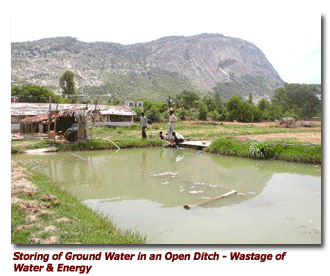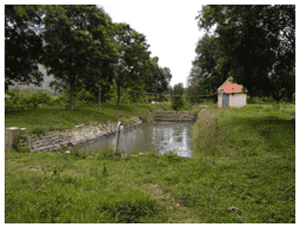IIEC Recent News
Water-Energy-Biomass (WEB) Co-Management Project

In India, IIEC is implementing a USAID-funded project to develop a model for the co-management of water, energy and biomass. The Water-Energy-Biomass (WEB) Project has been designed to improve the efficiency of water and electricity use in biomass production and the use of biomass in improving water and electricity supply. The project covers 5 villages, over 5147 ha and a population of 11800. The analysis confirms that in the agriculture sector in India, inefficient use of any individual resources, say water, results in falling yields in energy and biomass resources, and efficiency in individual resources benefits all others.
In the agriculture sector, an important resource conservation technique is crop diversification. In the WEB project area, this would result in an improved income of $4.50/ha, a reduction in production cost of $9.50/ha, reduction in water demand by almost 1.0 Million Cubic Meters (MCM) per year and a subsequent decrease in electricity demand of approximately 200 MWh/year. Two biomass, primarily agricultural residue, based electricity generation units, of 750 KW and 500 KW, are p lanned in the project area. Electricity conservation and alternate sources will result in GHG emission reduction of almost 8600 MTCO2 per year and additional emission reduction will be achieved from the recommended land use change and bio-fuel use.
lanned in the project area. Electricity conservation and alternate sources will result in GHG emission reduction of almost 8600 MTCO2 per year and additional emission reduction will be achieved from the recommended land use change and bio-fuel use.
The implementation of the Water-Energy-Biomass (WEB) project requires large scale grass root intervention as it addresses concerns in multiple sectors. Government departments namely, revenue, ground water, irrigation, agriculture, marketing, electricity and so on, have a direct presence in the rural areas and individually implement various initiatives. The WEB project is being implemented through relevant government agencies, as this would facilitate the mainstreaming of the multi-sector program into government policy and planning. The Centre for Sustainable Technologies (CST), in the Indian Institute of Science (IISc) is a key partner in evaluation, design and implementation of the biomass component of the project. Local communities are closely associated with the project from the initial stage of baseline data collection, through periodic discussions. The village committees have passed resolutions, accepting the biomass-based power units and the WEB interventions, creating a higher degree of ownership among the villagers.
The project is unique in its blend of technological, policy level and social interventions. For more information, please contact Sanjay Dube at This email address is being protected from spambots. You need JavaScript enabled to view it. .

